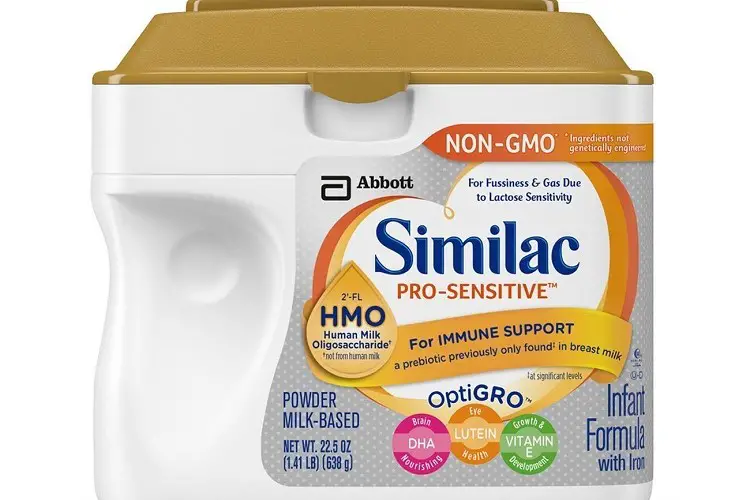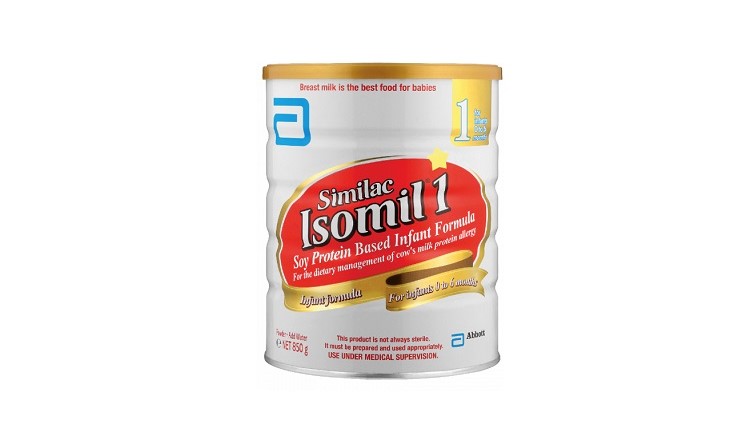When choosing between the Similac vs Isomil formula, many parents often wonder which is better for their little one.
Similac and Isomil are both formula brands manufactured by Abbott Nutrition. Both formulas are designed to provide all the essential nutrients and vitamins that infants need to grow and develop.
However, the two have key differences, such as that Similac is made from cow’s milk while Isomil is made from soy protein.
Ultimately, the choice between these two formulas will depend on your baby’s individual needs and any dietary restrictions they may have.
It’s hard to tell which brand is more suitable if you don’t compare Similac vs Isomil brands regarding their benefits and nutritional information.
Here’s a comparison of the two brands to help you make an informed decision:
Similac Vs Isomil – Product Comparision
Similac

Similac is an infant formula brand designed to mimic breast milk’s composition closely.
It is formulated with a blend of carbohydrates, proteins, fats, vitamins, and minerals to provide essential nutrients for a baby’s growth and development.
Similac products typically contain cow’s milk as a protein source.
There are different variations of Similac formulas, each designed to cater to specific needs:
- Similac Advance: Designed to support brain and eye development, immune support, and overall growth.
- Similac Sensitive: Formulated for babies with sensitive tummies, often featuring lactose as the primary carbohydrate.
- Similac Pro-Advance/ Pro-Sensitive: These formulas are enriched with probiotics to support digestive health.
History
One of the oldest and best-known infant formula brands is Similac, which has a long history. Below is an outline of Similac’s past:
Initial Years
The Moores and Ross Milk Company, established in 1920 in Columbus, Ohio, USA, by Alfred Bosworth and Sidney Ross, launched the Similac brand.
Similac was first intended to be a formula that could replace breast milk and give infants who couldn’t breastfeed the necessary nutrition.
Growth and Innovation
When Abbott Laboratories bought the Moores and Ross Milk Company in the 1950s, Similac became a part of Abbott.
Similac conducted ongoing research and development throughout the years to enhance the composition of its recipe.
In the 1950s, Abbott Laboratories acquired the Moores and Ross Dairy Company, bringing Similac under the Abbott umbrella.
Over the years, Similac has continuously researched and developed to improve formula ingredients to meet the nutritional needs of infants better.
Introducing new formulations, improved packaging, and a better understanding of nutrition have made Similac a well-known and trusted brand among parents and healthcare professionals.
Scientific Advancement
As nutritional science advances, Similac has introduced formulas closer to the composition of breast milk, emphasizing nutrients such as DHA (docosahexaenoic acid) and ARA (arachidonic acid) to support brain and eye development.
Similac has created specialized formulas to address specific needs, like Similac Sensitive for babies with delicate stomachs and Similac Pro-Advance, which includes probiotics for digestive health.
Continuous Innovation
Over the years, Similac has continued to innovate, incorporating the latest scientific research into its formulas.
The brand has also adapted to changing consumer preferences, offering options like organic and non-GMO formulas to meet the needs of health-conscious parents.
Today, Similac is recognized as the leading brand in infant nutrition, and its formulas are widely used by parents and recommended by healthcare professionals worldwide.
The brand’s long history and commitment to quality and innovation have contributed to its reputation as a trusted choice for infant nutrition.
Benefits of Similac
Similac, a widely recognized infant formula brand, has several benefits, making it a popular choice among parents and caregivers.
Here are the benefits of the Similac formula:
Nutritional Ingredients
The Similac formula is designed to provide a comprehensive array of essential nutrients that are crucial for supporting the healthy growth and development of your precious little one.
This exceptional formula boasts a perfectly balanced combination of proteins, carbohydrates, fats, vitamins, and minerals that closely mimic the nutritional profile of breast milk.
With Similac, you can rest assured that your baby receives the best nutrition and support they need to thrive and reach their full potential.
Various formulas
Similac offers various formulas to meet different needs, including Similac Advance, Similac Sensitive, and Similac Pro-Advance.
These formulas address various factors such as digestion, sensitization, and immune support.
Scientific Research
Similac formula was developed based on scientific research and advances in infant nutrition.
The brand constantly updates its formulas to incorporate the latest nutritional discoveries and knowledge, ensuring babies receive the best nutrition possible.
Nutritional Supplements
Some Similac formulas are fortified with additional nutrients, such as DHA and ARA ( important fatty acids for brain and eye development). Prebiotics and probiotics support digestive and system health immunity.
Lactose-Free Options
If your baby is experiencing lactose intolerance or sensitivity to cow’s milk proteins, Similac has formulated specialized options to cater to their nutritional needs.
Similac Sensitive and Similac Isomil Advance are two sugar-free alternatives made from soy milk.
These formulas offer a safe and effective solution for babies who require lactose-free options to thrive.
Convenience
Similac formula offers a convenient option for breastfeeding, especially when breastfeeding is impossible or desired.
They can be easily prepared by mixing powdered formula with water as directed.
Quality Control
The Similac brand is recognized for its commitment to quality and safety.
Manufacturing processes are subject to strict quality control measures to ensure that formula is safe for infants.
Nutritional Information
| Nutrients | Per 100ml |
| Calories | 66-68 kcal |
| Protein | 7.5-8.5 g |
| Carbohydrates | 1.8-2.2 g |
| Fibre | Very low |
| Fats | 3.-3.6g |
| Vitamins | A, E, D, K, B |
| Minerals | Calcium, iron, zinc and more |
Isomil

History
Isomil is Abbott’s brand of soy-based infant formula.
It is specifically designed for babies who are lactose intolerant, allergic to cow’s milk protein, or whose parents choose to avoid animal-based products for various reasons.
Isomil formulas are made from soy protein isolate and are lactose-free. Similar to Similac, there are variations of Isomil formulas, such as Isomil Advance and Isomil soy.
Each caters to different dietary needs.
Here’s an overview of the history of Isomil:
Isomil was introduced in the 1980s as part of Abbott’s efforts to provide an alternative formula option for children who could not tolerate or consume cow’s milk formula.
The introduction of Isomil addressed the dietary needs of infants with lactose intolerance or cow’s milk protein allergy, as well as families who preferred soy, plant-based formula.
Development and Expansion
Isomil was developed from isolated soy protein derived from soybeans and used as the protein source in the formula.
Over the years, Isomil’s formulas have been refined to improve nutritional content and match essential nutrients needed for infant growth and development.
Isomil is a lactose-free product suitable for babies with lactose intolerance, that is, the inability to digest lactose, a sugar found in cow’s milk formula.
Benefits of Isomil
Lactose-free Option
Isomil is a highly recommended formula for infants who suffer from lactose intolerance.
This lactose-free formula is a great alternative for parents who want to provide their babies with the necessary nutrients without the risk of digestive discomfort.
Isomil is made with soy protein, vitamins, and minerals essential for a baby’s growth and development.
The formula is also easy to digest and gentle on the stomach, making it an excellent choice for babies with sensitive stomachs.
With Isomil, parents can rest assured that their babies receive a safe, healthy, and nutritious formula that meets their dietary needs.
Cow’s Milk Protein Allergy:
Isomil is an alternative for babies allergic to cow’s milk protein.
Some babies may experience allergic reactions when consuming cow’s milk-based formulas, and switching to a soy-based formula like Isomil can help alleviate these symptoms.
Vegetarian or Vegan-friendly
Families who follow a vegetarian or vegan lifestyle and avoid animal products can choose Isomil as a plant-based alternative to cow’s milk formulas.
Food Preferences
Isomil is an excellent option for parents who have infants with special dietary needs or preferences.
It is specifically formulated to avoid animal or dairy products, making it a safe and healthy choice for infants with allergies or intolerances to these ingredients.
This plant-based alternative provides all the essential nutrients needed for growth and development, making it a great option for those looking for an alternative to traditional dairy-based formulas.
So, if you are looking for a safe and effective way to nourish your little one, Isomil may be just what you need.
National balance
Isomil is formulated to provide a balanced nutritional profile, including essential proteins, carbohydrates, fats, vitamins, and minerals needed for your baby’s growth and development.
Nutritional Information
| Nutrients | Per 100ml |
| Calories | 66-68 kcal |
| Proteins | 2.1-2.3g |
| Carbohydrates | 7.8-8.2g |
| Fats | 3.3-3.5g |
| Fibre | Very low |
| Vitamins | A, D, E, K, B |
| Minerals | Calcium, zinc, iron |
Read Also:
Choosing Between Similac Vs Isomil
The choice between Similac and Isomil depends on factors such as your baby’s nutritional needs, known allergies or sensitivities, and personal preferences.
You may consider Similac formulas if your baby has no specific dietary restrictions or allergies.
However, if your baby has lactose intolerance or cow’s milk protein allergy, Isomil might be a suitable option.
It’s important to consult with your pediatrician before deciding on infant formula.
They can provide personalized recommendations based on your baby’s health, dietary needs, and potential allergies or sensitivities.
Always follow the instructions on the formula packaging and seek medical advice if you have any concerns about your baby’s nutrition.
Conclusion
It is important to note that while Similac and Isomil offer many benefits, every baby is unique, and what works for one may not do for another.
Before deciding which formula to choose between Similac Vs Isomil, consult with a pediatrician, preferably someone familiar with your baby’s history, to guide you in making the right choice.
